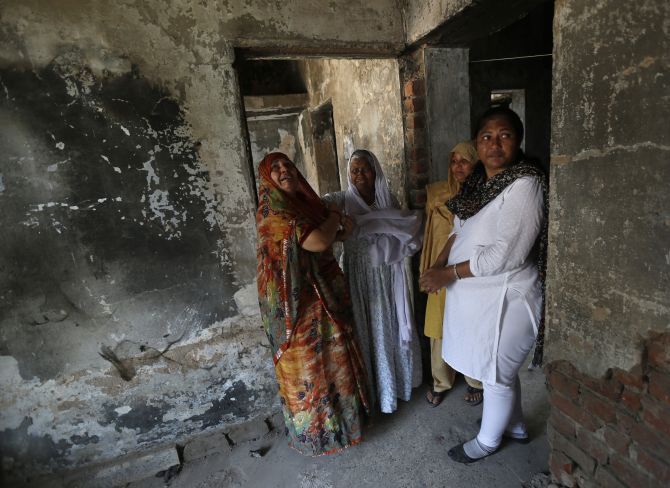
The prosecution in 2002 Gulberg housing society massacre case on Monday sought death penalty or life imprisonment till death for all the 24 convicts, calling the attack "barbaric and inhuman" even as a special court deferred further hearing on sentencing to June 9.
Pleading for maximum punishment, the prosecution said capital punishment could be considered by the court or the convicts be sent to jail and ordered to remain there till their last breath.
As arguments over the quantum of sentence that lasted for and-a-half hours remained inconclusive, the special SIT court judge P B Desai adjourned further hearing in the case to Thursday.
The court had on Friday convicted 24 and acquitted 36 others, while dropping conspiracy charges in the killings of 69 persons including former Congress Member of Parliament Eshan Jafri in Gulberg housing society on February 29, 2002 in post-Godhra riots when Narendra Modi was Gujarat chief minister.
The massacre shook the nation when a mob of 400 people set about attacking the housing society in the heart of Ahmedabad and killed the residents.
It was one of the nine cases of the 2002 Gujarat riots probed by the Supreme Court-appointed SIT. Out of the total 66 accused, six died during the trial. Of the 24 convicted, 11 have been charged with murder, while 13 others including Vishwa Jindu Parishad leader Atul Vaidya have been convicted for lesser offences.
Public prosecutor representing the Supreme Court-appointed Special Investigation Team, R C Kodekar in his arguments before the court said as per section 149 Indian Penal Code all those who are convicted should be given maximum punishment which is capital punishment.
"If capital punishment is not considered, they should be sent to jail till they live," he said.
Section 149 of the IPC reads, "If an offence is committed by any member of an unlawful assembly in prosecution of the common object of that assembly, or such as the members of that assembly knew to be likely to be committed in prosecution of that object, every person who, at the time of the committing of that offence, is a member of the same assembly, is guilty of that offence."
"The manner of crime was cruel, barbaric and inhuman. Victims' bodies were roasted alive, in the crime for which there was no provocation, much less in case of women and children who were defenceless," Kodekar told the court.
"Out of those 39 bodies recovered after crime, 20 were women and six children. Most families of Gulberg Society lost their kith and kin while three families lost all members," Kodekar said.
"Out of 30 missing, 14 were women and eight children," Kodekar said, adding that women and children were defenseless and unarmed.
After the Gulberg Society incident, 39 bodies were recovered, while 30 others were declared dead as they were not traceable after seven years, taking the death toll to 69.
A lawyer for the victims S M Vora also sought maximum punishment for the accused and argued that sentencing for each offence should not run concurrently so that they spend their entire life in jail.
A lawyer for the accused, however, rejected the demand of capital punishment or maximum punishment in his arguments, saying the incident was spontaneous and there were enough provocations for it.
Image: Survivors of the 2002 Gujarat riots weep inside a house that was burnt and damaged in the riots at the Gulbarg Society in Ahmedabad. Photograph: Ahmad Masood/ Reuters









